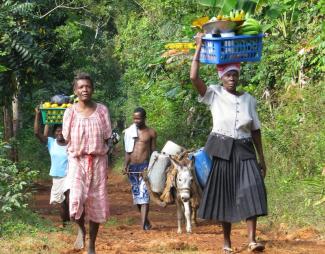International cooperation
Building trust

The central idea of community organisation is that, to be stable, networks should involve local leaders who others in the community look up to and whose advice they will follow. The local leaders should enjoy local people’s trust and be able to speak in their name. A good network is made up of local leaders who represent very different groups that had not been cooperating before.
To implement such an approach, three specific changes would have to be made to the way international organisations (IOs) typically operate in Haiti:
- Local communities are the key to empowerment, but IOs traditionally focus on state agencies. The truth is that the Haitian government has always had only very limited capacities for the effective implementation of projects. However, it is possible to compensate for extremely limited statehood by supporting and coordinating local leaders and building a high level of trust.
- “Bottom-up” projects should take precedence over large projects: IOs and especially development banks like to disburse a lot of money at once. Accordingly, they prefer to fund large projects instead of doing piecemeal work. Community organising, in contrast, focuses on relationships and building trust, not on disbursement. Local leaders cannot even be identified without detailed knowledge of local structures. Consequently, these projects require a lot of time, but not a lot of money.
- Long-term projects need long-term financing: about 90 % of aid money goes to humanitarian projects that usually last a few months. As a result, IO employees have to constantly find creative solutions to “weave” one project into the next. Community organising requires project partners to keep going even if they don’t see immediate results.
These hurdles can be overcome. To strengthen Haiti’s dairy sector, for example, the FAO started a successful intervention that used “project weaving”. The primary goal is to get dairy farmers to cooperate among one another. The meetings, which take place over a longer period, are designed to build trust and help the farmers identify shared interests and establish formal cooperatives. Their social relationships are a top priority because their association has to perform well despite diverging individual concerns.
Whereas in the past, for instance, each dairy farmer sold his milk on the market individually, now this task is performed by envoys from the cooperative. The FAO is facilitating regular exchange concerning veterinary care and milking of the cows. It keeps identifying local leaders who are especially committed to promoting collective interests. In addition, the FAO is providing expertise, technical equipment and space. It is organising network meetings for local leaders from different places. (ls)







